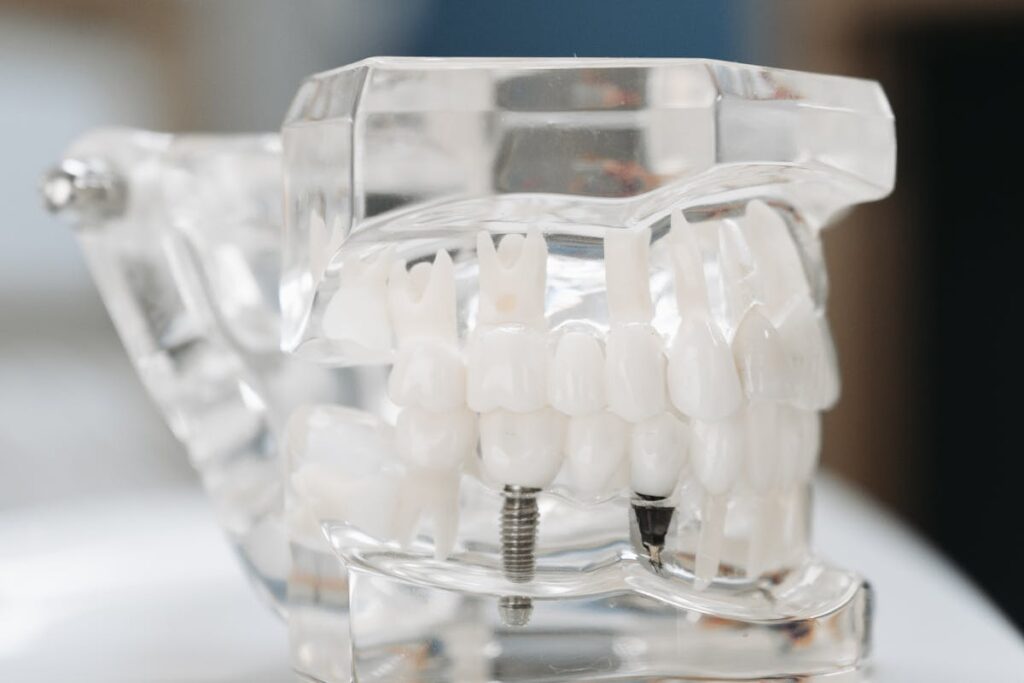The intricacies of full mouth reconstruction, particularly the placement of dental implants, holds a significant place in modern dentistry. Dental implants, acting as sturdy foundations for artificial teeth, have revolutionized the approach towards oral rehabilitation, providing a solution that is both aesthetically pleasing and structurally sound. However, the complexity of this treatment demands a thorough understanding of its processes, benefits, and potential risks. What are the underlying mechanisms that make dental implants so effective? And how do they contribute to the overall success of a full mouth reconstruction? Let’s further explore this fascinating aspect of dental science.
Understanding Full Mouth Reconstruction
Starting on the journey of full mouth reconstruction, it’s important to comprehend every aspect of this complex dental procedure. This multi-faceted treatment approach aims to restore oral functionality and aesthetic appearance, often combining several dental disciplines such as prosthodontics, orthodontics, and periodontics.
Treatment options can vary extensively based on the patient’s unique needs and conditions. Decisions about specific procedures are made after a thorough examination of the patient’s oral health, including assessments of teeth, gum tissue, occlusal function, and jawbone health. Treatments may include crowns, dental bridges, veneers, dental implants, and orthodontic aligners, to name a few.
Patient considerations are paramount in the planning and execution of full mouth reconstruction. Age, overall health, personal preferences, and financial capability all play significant roles in determining the most suitable treatment plan. It’s imperative for patients to have a clear understanding of the procedure’s intricacies, potential benefits, and risks before committing to this extensive process. Ensuring informed decision-making promotes patient satisfaction and enhances the success rate of the procedure. Full mouth reconstruction, while complex, can dramatically improve a patient’s oral health and quality of life.
The Role of Dental Implants
As a cornerstone of restorative dentistry, dental implants play an integral role in full mouth reconstruction. They serve as substitutes for tooth roots, providing a strong foundation for fixed or removable replacement teeth. This is achieved through a process called osseointegration, where the implant fuses with the surrounding bone, fundamentally becoming part of the patient’s anatomy.
Implant types vary considerably, depending on the specific needs of the patient. Endosteal implants, for example, are placed directly into the jawbone, while subperiosteal implants sit on top of the bone but beneath the gum tissue. The selection of implant type is an essential part of the treatment planning process and can greatly impact the overall success of the reconstruction.
Longevity factors for dental implants are multifaceted and include the patient’s oral hygiene habits, the skill and experience of the dental professional, and the quality of the patient’s jawbone. With proper care and maintenance, dental implants can last for many decades, making them a long-term solution for patients undergoing full mouth reconstruction. It is this combination of versatility, durability, and longevity that underscores the vital role of dental implants in restorative dentistry.
Advantages of Dental Implants
Building on the fundamental role they play in restorative dentistry, dental implants offer a host of advantages that make them a preferred choice for both patients and professionals. First and foremost, they provide a durable solution to missing teeth, with a longevity benefit that surpasses other dental restorations. Dental implants are designed to last many years, often a lifetime, with proper care and routine dental check-ups.
From a cost consideration perspective, while the initial investment may be higher than other dental procedures, the long-term benefits of dental implants often offset this initial outlay. The need for fewer replacements and repairs in the future translates into cost savings for the patient.
Dental implants also offer an aesthetic advantage, closely mirroring the appearance of natural teeth. This greatly improves patients’ self-confidence and overall quality of life. Additionally, they provide stability and comfort, eliminating the risk of slippage while talking or eating, which is often a concern with dentures.
Lastly, dental implants positively impact oral health. Unlike bridges, they don’t require altering other teeth, thereby preserving natural tooth structure. Moreover, they prevent bone loss that typically occurs under missing teeth, promoting overall dental health.

The Dental Implant Procedure
Understanding the procedure of dental implant surgery is vital for potential patients, as it allows one to be more aware and prepared for the process. This discussion will encompass the steps involved in the implant surgery process, providing an all-encompassing overview for clarity. Additionally, we will provide essential post-procedure care tips to guarantee a smooth recovery and maintenance of the dental implant.
Implant Surgery Process
Numerous patients undergo the dental implant procedure each year, a surgical process that demands both precision and expertise. The implant surgery process involves several stages, each essential in ensuring successful full mouth reconstruction.
Initially, a thorough examination of the oral cavity is conducted, where the dental professional assesses the patient’s oral health and determines the appropriate implant types to be used. This could range from endosteal implants, which are inserted directly into the jawbone, to subperiosteal implants resting above the jawbone under the gum.
Following the selection of suitable implant types, the surgical procedure commences. The dentist places the implants into the jawbone, serving as a sturdy base for the replacement tooth or bridge. After installing the implants, an important part of the process ensues – the healing phase.
The healing process is essential as it allows the implant to integrate fully with the bone, a phenomenon known as osseointegration. This period may last several weeks to months and is critical for the implant’s stability and longevity. Once the implant has successfully fused with the jawbone, the dentist can mount the artificial teeth, completing the dental implant procedure.
Post-Procedure Care Tips
Following the successful completion of the dental implant procedure, the attention of both the dentist and patient turns towards the meticulous care required to promote ideal implant health and longevity. Key factors in post-procedure care include pain management, dietary adjustments, and a strict oral hygiene regimen.
- Pain Management: Pain is an expected outcome after an implant procedure. However, it can be managed effectively with prescribed painkillers and anti-inflammatories. Regular application of ice packs can also help reduce swelling and discomfort. Should the pain persist beyond a reasonable timeframe, consultation with the dentist is imperative.
- Dietary Adjustments: A soft diet is recommended immediately following the procedure to protect the implant site and facilitate healing. Food items should be soft, easy to chew, and non-acidic. Gradual reintroduction of harder foods can commence once the implant site has adequately healed.
- Oral Hygiene Regimen: Maintaining oral hygiene is essential for preventing potential infections. Regular brushing, flossing, and use of an antiseptic mouthwash should be adhered to, while avoiding vigorous rinsing or spitting for a few days post-procedure.
Proper post-procedure care is paramount in ensuring the success and longevity of dental implants, requiring both patient commitment and professional guidance.
Caring for Your Dental Implants
How does one properly care for their dental implants? Establishing good hygiene practices is vital, and there are specific implant maintenance tips to follow to guarantee the longevity of your dental implants.
Dental implants, like natural teeth, require diligent and regular cleaning to prevent the accumulation of plaque and tartar. Brushing twice a day using a soft-bristled toothbrush and non-abrasive toothpaste is recommended. Flossing daily is essential to remove debris between the implants, and an interdental brush can be useful for cleaning hard-to-reach areas.
Using a low-abrasive toothpaste can prevent scratching the surface of the implants. A non-alcoholic mouthwash can also be beneficial in eliminating bacteria without causing dryness in the mouth, which could lead to bacterial growth. Regular check-ups with your dentist are important for professional cleanings and to monitor the condition of your implants.
Diet also plays a significant role in implant maintenance. Hard or sticky foods can damage the implants or their crowns. Therefore, it’s advisable to consume a balanced diet and avoid such foods.
Potential Risks and Complications
Despite the high success rate of dental implants, potential risks and complications should not be overlooked. While dental implants are a reliable solution for missing teeth, they come with a set of challenges that potential patients should be aware of.
- Implant Failure and Infection Risk: Factors such as poor oral hygiene, smoking, and certain systemic diseases can increase the risk of implant failure and post-surgical infections. If not promptly addressed, these issues could prolong healing time and lead to other complications.
- Bone Loss and Nerve Damage: In rare cases, dental implants may lead to bone loss if the implant does not fully integrate with the bone. Additionally, if the implant is placed too close to the nerve, it may cause nerve damage, leading to pain or numbness.
- Sinus Complications, Aesthetic Concerns, and Cost Factors: If implants are placed in the upper jaw, there’s a risk of sinus complications. Aesthetic concerns can also arise if the implant and the crown do not match the natural teeth in color or shape. Ultimately, cost factors should be considered as dental implants can be a substantial investment.
Understanding these risks and complications can help patients make informed decisions about dental implants.
Real-life Success Stories
In the domain of dental health, there are countless individuals who have found a renewed sense of confidence and wellbeing through dental implants. Their compelling transformation journeys, meticulously documented through detailed patient accounts, provide invaluable insight into the life-changing potential of full mouth reconstruction.
One such patient, a victim of extensive dental decay and multiple tooth loss, was initially apprehensive about the procedure. However, the life-altering restorative surgery proved to be a game-changer. The patient’s account reflected the transformation from a life marred by discomfort and self-consciousness to one filled with newfound confidence and a radiant smile.
Another account narrates the story of a patient who had been living with ill-fitting dentures causing pain and difficulty in eating. Dental implants not only restored the functionality of her mouth but also improved her quality of life considerably.
These real-life success stories underscore the transformative power of dental implants in full mouth reconstruction. They serve as a confirmation to the technological advancements in dental health and the profound impact they can have on an individual’s life. Through dental implants, patients can regain not only their lost smile but a sense of wellbeing and confidence.
Frequently Asked Questions
What Is the Average Cost of a Full Mouth Reconstruction With Dental Implants?
The average cost of extensive oral rehabilitation varies widely, typically ranging from $30,000 to $60,000. Financing options are often available, providing long-term benefits such as improved oral health, function, and aesthetics.
Are There Any Alternatives to Dental Implants for Full Mouth Reconstruction?
Yes, there are alternatives to dental implants for full mouth reconstruction. Dental bridges and removable dentures are commonly used options. These methods can provide functional, esthetic solutions for patients seeking complete oral rehabilitation.
Do Insurance Plans Typically Cover Full Mouth Reconstruction With Dental Implants?
Insurance coverage for procedures like dental implants varies considerably between providers. It’s imperative to review your specific dental benefits, as some plans may partially cover such procedures, while others might not offer coverage at all.
How Long Will It Take to Recover From a Full Mouth Reconstruction?
The recovery timeline from extensive dental procedures varies per individual, typically ranging from a few weeks to several months. Ideal recovery is facilitated by diligent post-operative care, including proper hygiene and follow-up appointments.
What Qualifications Should a Dentist Have to Perform Full Mouth Reconstruction With Implants?
A dentist should ideally possess a degree in dental surgery or dental medicine, with additional specialization in prosthodontics or oral surgery. Extensive experience in implantology and a demonstrated track record of successful implant procedures are also important qualifications.
